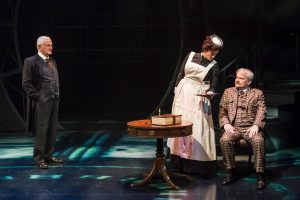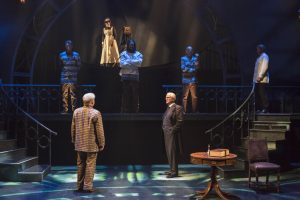
L-R Henry Woronicz, Jen Johansen and Torrey Hanson. Courtesy of Zach Rosing. Used with permission.
The premise of the play “Holmes and Watson,” a mystery by Jeffrey Hatcher, which I saw Saturday at the Indiana Repertory Theatre is simple. Among three mental patients claiming to be, which is the legendary detective Sherlock Holmes? Sort of like “To Tell the Truth,” a popular 1950s-60s TV quiz show.
Playwright Hatcher is quite familiar with Sir Arthur Conan Doyle‘s fictitious world, having written the screenplay for “Mr. Holmes,” a 2015 film starring Ian McKellen, as well as “Sherlock Holmes and the Adventure of the Suicide Club,” his play that premiered in 2011. To construct “Holmes and Watson,” Hatcher uses the period between Holmes’s supposed demise at the hands of his archenemy Professor Moriarty in Conan Doyle’s “The Final Problem” and the sleuth’s return in “The Adventure of the Empty House.”
Hatcher’s tangled plot, replete with red herrings, has Holmes’s sidekick Watson at a dreary asylum on a bleak, remote island. He is there to determine which of the three previously mentioned inmates is the real Sherlock Holmes,who went missing three years prior, after an apparently fatal scuffle with rival Moriarty on a rocky cliff side. Incorporating the same elements that make Conan Doyle’s crime fiction so engaging, “Holmes and Watson” takes place in a sinister setting and is full of oddball characters and loads of detail to process.

“Holmes and Watson” – Courtesy of Zach Rosing. Used with permission.
Expertly directed by former IRT associate artistic director Risa Brainin, the production featured a seasoned company of actors, with most playing multiple roles that included Torrey Hanson (Dr. Watson), Henry Woronicz (Dr. Evans), Ryan Artzberger (Orderly), Jennifer Johansen (Matron), Michael Brusasco (Holmes #1), Nathan Hosner (Holmes #2) and Rob Johansen (Holmes #3). Their performances were uniformly absorbing, but standing out were the husband/wife Johansens—he as the deaf, dumb and blind Holmes and she as the impervious matron with the glowering stare.
As far as the show’s production elements, they all contributed to creating the gloomy and foreboding atmosphere required for Holmes’s world. Designer Robert Mark Morgan’s set ingeniously shifts between the asylum and other locations. Devon Painter’s turn-of-the-century costumes effectively reflect the times. Michael Klaers’s lighting design creates an ominous mood and composer Michael Keck’s violin-solo score adds just the right dose of melancholia.
I must admit, when it comes to mysteries, I am certainly no expert. Usually it takes me a while, especially if I don’t keep up with the story, which in this case, with its 90 minutes of twists and turns, can be a real challenge. So, I would advise that you stay focused and pay attention to key hints. But no matter your attention span, I guarantee you will be entertained, especially if you have solved the puzzle before the engrossing play’s surprising finale that is a pure delight.
For tickets and information about “Holmes and Watson” call the IRT ticket office at (317) 635-4252 or go to irtlive.org. The show runs through October 21.





